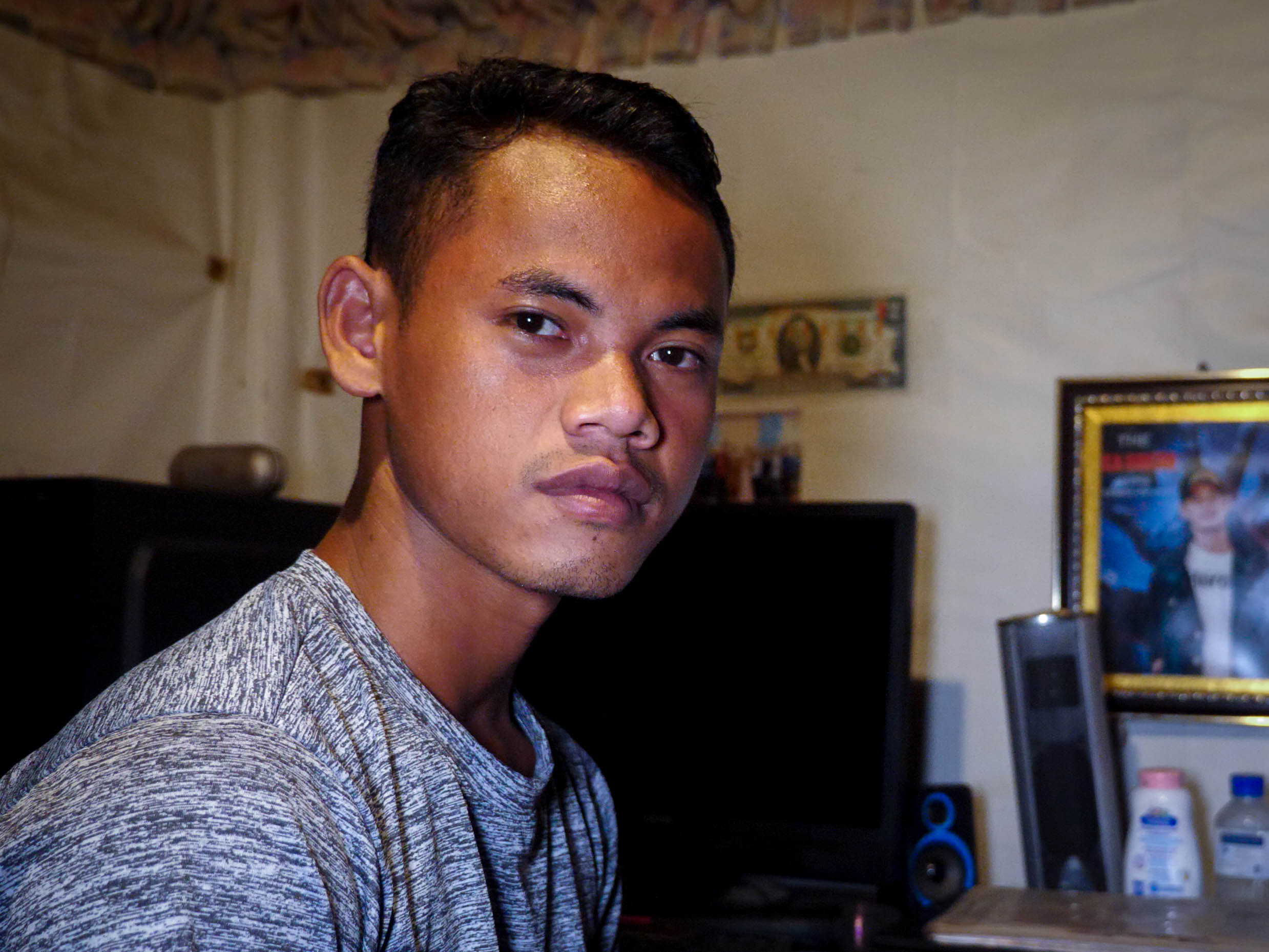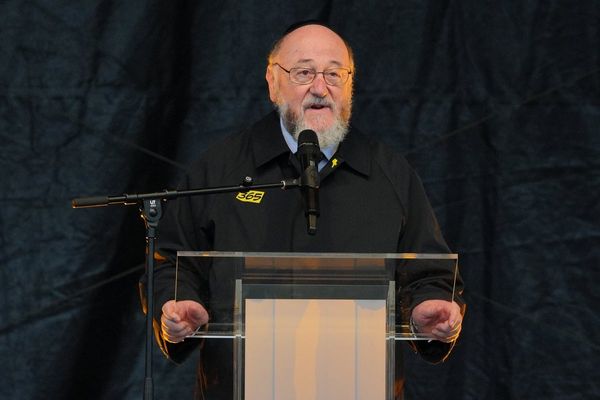
Phnom Penh, Cambodia – Cambodian rapper Kea Sokun was once jailed for his hard-hitting lyrics, but that did not stop him from forging ahead with his latest release, Workers Blood, set to scenes of striking garment workers beaten by military police. At least four workers died in the protests.
“They fought for their rights, for freedom, the search for justice full of obstacles,” Sokun raps in Khmer. “I would like to commemorate the heroism of the workers who sacrificed their lives.”
Within days of the song’s release on January 3 — the ninth anniversary of the government’s deadly response to a vast garment workers’ strike — the Ministry of Culture warned the music video was “inciting content that may cause insecurity and social disorder”.
The leaders of the human rights organisations that commissioned the song were soon hauled in for questioning. Police threatened legal action unless the video was removed from the websites and Facebook pages of the Cambodian League for the Promotion and Defence of Human Rights (LICADHO) and the Center for Alliance of Labor and Human Rights (CENTRAL), representatives for the rights groups say.
“Every year we post [about the anniversary of the protests] and we have no problem, so why now when we only used old images with a song about a real event, why is it incitement?” Am Sam Ath, LICADHO’s operations director, told Al Jazeera. “We regard the order to remove the video as a violation of LICADHO’s right of expression.”
National police spokesperson Chhay Kimkoeurn claimed no threats were involved and said police merely sought to “educate” the rights groups.
“We didn’t threaten them with legal action, but if they don’t obey the law we will enforce the law,” he told Al Jazeera, referring to “incitement” to commit a crime, a vague charge commonly wielded against those perceived to have criticised the government.

The censorship of Workers Blood is part of an ongoing crackdown on freedom of expression in Cambodia that is gathering pace ahead of national elections in July. Nearing his fourth decade in power, Prime Minister Hun Sen outlawed the main opposition party ahead of the last elections five years ago, and is now preparing to hand control of the ruling Cambodian People’s Party (CPP) to his son Hun Manet.
Civil society organisations, opposition politicians and rappers alike are being forcefully reminded of the limits of what can and cannot be said in an increasingly restrictive society.
“I think the government is trying to legitimise itself and this is a transition period of power, so they are looking at civil society as threats,” Khun Tharo, program manager for CENTRAL, told Al Jazeera. “The government feels this song has really discredited [them].”
A song seeking justice
While Cambodia’s music industry has exploded in recent years, few rappers besides Sokun have dared bring direct social commentary into their songs. Other rappers who have spoken out against the government’s actions faced death threats or were forced to issue public apologies.
“I always want to use songs as mirrors to reflect the reality in society,” Sokun told VOD, an online media outlet in Cambodia, last year. “I just want to speak the truth.”
Growing up in a poor household down the road from the World Heritage site of Angkor Wat and dropping out of school in his early teens, Sokun was arrested and sentenced to one year in prison in 2020 for a series of nationalist songs touching on topics like Cambodia’s borders, and filled with unsparing takedowns of the rich and powerful.
A judge offered to release Sokun if he apologised for his lyrics, but the rapper refused and served the time, boosting his popularity across Cambodia.
The 24-year-old now has more than a quarter of a million subscribers on his YouTube channel and continues to target political issues and injustice, producing a song describing his incarceration and another about the filling in of Phnom Penh’s lakes for development.
But it was Workers Blood that hit a nerve with the government because it was a reminder of the scale of garment workers’ protests that began in late 2013, says Sabina Lawreniuk, a University of Nottingham research fellow who studies Cambodia’s garment industry.
Tens of thousands of workers took to Veng Sreng Boulevard in Phnom Penh to demand higher wages and the government was eventually forced to double the minimum wage to $160 per month. It has since increased wages annually, even as aggressive new laws on trade unions have also been introduced that rights groups say are intended to stifle independent union organising.
“Labour politics in Cambodia are explicitly entangled with electoral politics in a way that some other human rights issues and struggles in Cambodia are not,” Lawreniuk told Al Jazeera. “That huge mobilization of people really unsettled the government.”
The protests came in the aftermath of the closely contested elections of 2013 when the Cambodia National Rescue Party spooked the CPP by capturing a large share of the votes on a platform calling for wage increases for garment workers and civil servants.

The Veng Sreng protests only ended after police and military forces began firing at the crowds, injuring dozens and killing at least four people on January 3, 2014. One protester, 15-year-old Khem Sophat, remains missing to this day.
“I don’t have hope that he will be found, his friend said he was shot and lay down on the street,” Sophat’s father, Khem Soeun, told Al Jazeera. “My child was very gentle, he was always helping the family.”
Sophat had lied about his age to get a job at a garment factory and sent money to his parents every month, his father said. He last saw his son nine months before the protests when he visited for the Khmer New Year holidays.
“After he went back to work, he never came back again,” Soeun said. “His mum, when she heard the song [Workers Blood], she cried all day, it reminded her of Veng Sreng street.”
The deaths were the result of “indiscriminate firing and excessive use of force by the military police,” according to a fact-finding report produced shortly after the protest by the labour rights group Asia Monitor Resource Center. No one has ever been held accountable for the workers’ deaths.
“Waiting for justice for nine years, a long time passed and nobody responsible, longing for a solution,” Sokun raps. “The eyes saw the truth, unforgettable, stuck in the minds of those who live.”
Vorn Pov, president of the Independent Democratic Informal Economy Association (IDEA), was beaten bloody by government security forces at the protest. As a prominent labour activist associated with Veng Sreng, Pov was questioned by police about Sokun’s song and later forced to remove it from his organisation’s Facebook page, even though IDEA had not sponsored the song.
“When listening to Sokun’s song, it is shocking, like it’s still new and fresh and so unjust for the victims,” Pov told Al Jazeera. “I feel this society cannot be relied upon to find the truth when injustice happens.”
Avoiding the ‘red line’
Ministry of Culture spokesperson Long Bunna Siriwadh would not elaborate on what specifically about Workers Blood triggered the allegation of incitement.
“I don’t analyse the meaning, I only speak to the principle of law and social order,” Siriwadh told Al Jazeera, claiming Sokun could keep making songs. “He can continue to do whatever he wants. But don’t cause turmoil to society, respect the law — it is easy like that.”
Hun Sen laid down a clear red line in a recent speech, warning the opposition party and other potential detractors that criticism of the ruling CPP would be met with legal action or violence. The CPP has already sued one of the opposition Candlelight Party’s vice presidents for $1m in defamation damages after he claimed there were issues with the electoral process, and this week police arrested another Candlelight leader for allegedly issuing a bad cheque.
In the run-up to Cambodian elections, freedom of expression is usually constricted, and while curbs might later be relaxed, the situation never returns to how it was before, according to Nottingham University researcher Lawreniuk.
“Although it feels like authoritarian control tightens around election time, and then it’s released, actually the government’s power has always been consolidating over time,” Lawreniuk said. “That’s what has enabled this slide toward de facto one-party rule.”

Sokun, who has stayed mostly silent since the crackdown, declined to comment for Al Jazeera, saying he was now experiencing “a lot of problems in his life”. But he has denied the song ran afoul of the law.
“Nothing is wrong with the song, there’s no incitement to cause turmoil,” he told Voice of America shortly after the video was censored. “We want the authorities to find justice for the victims, but instead they take action against the one who posts [the song], I feel regret about this.”
The original posts may have been removed, but Sokun’s song continues to be shared widely across social media on other pages and platforms. If the government’s aim was to stop the music video from being seen, it has not worked, CENTRAL’s Tharo said.
“Now it has gone viral,” he said. “I think our target has been reached, because the whole idea was to create a public sentiment of remembrance [about Veng Sreng].”







